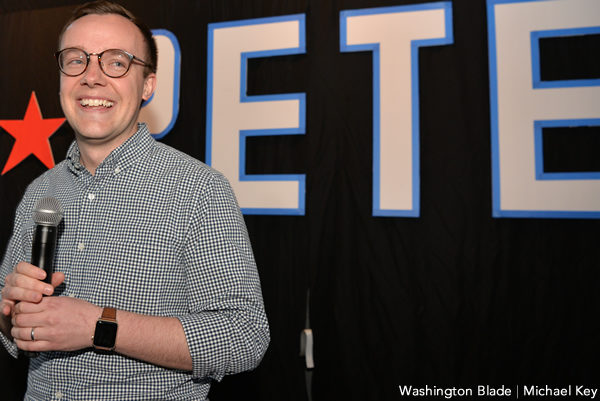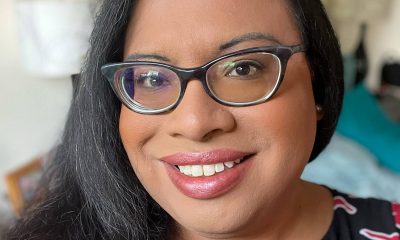Books
‘I Have Something to Tell You’ not typical, political puff piece
Chasten Buttigieg memoir a frank look at history-making campaign


As a tween, if you’d said that one day a gay man, with his husband as First Man, could be president of the United States, I’d have thought you were nuts.
I’m glad Pete Buttigieg, 38, the former mayor of South Bend, Ind., proved me wrong! In April 2019, he became the first openly gay major presidential candidate. Buttigieg dropped out after losing badly in the South Carolina primary due to his failure to connect with Black voters.
You may or may not like Buttigieg’s politics. But I’d bet that if you’re queer, you were awed by the history he made by entering the presidential race!
One of the most moving parts of the campaign was Buttigieg’s marriage to Chasten Glezman Buttigieg. “Nothing in my life, from shaking hands with a president to experiencing my first rocket attack,” Pete Buttigieg wrote in his memoir “Shortest Way Home,” “matched the thrill of holding Chasten’s hand for the first time.”
Chasten Buttigieg, 31, who has more than 400,000 Twitter followers, was a major asset to Pete Buttigieg’s campaign. Chasten, who was raised in Traverse City, Mich. and calls Pete Buttigieg “Peter,” has written a funny, touching memoir.
Often, memoirs of political campaigns are merely pablum. “I Have Something to Tell You,” released on Sept. 1, is far from a hard-nosed take on the Buttigieg campaign. How could Chasten be objective about his husband? From the moment when Chasten and Pete eat Scotch eggs on their first date, Chasten is totally smitten with Peter. Peter is intelligent, unflappable and caring. “The only thing that’s annoying about Peter’s lifestyle is how reasonable and laid back he is about, well, everything,” Chasten writes.
It’s clear that since the campaign ended, Pete Buttigieg has been working to extend his brand. His 20-episode podcast “The Deciding Decade” premiered on Sept. 9, and his new book “Trust: America’s Best Chance” comes out on Oct. 6. Chasten’s memoir fits into the effort to build Pete Buttigieg’s political future.
Yet, “I Have Something to Tell You” isn’t your typical, political puff piece. It’s often refreshingly candid. It gives us a ringside seat to what it was life to be the first spouse of the first gay presidential candidate.
Chasten realized how important he and Pete Buttigieg (as a presidential candidate and spouse) were to the LGBTQ community two weeks before Buttigieg officially announced he was running. An older woman, recognizing the political couple, stopped them as they walked down 14th Street in Washington, D.C. “I’m the mother of two gay children,” she told them, “and what you’re doing for this country and for them … I am just so proud of you and so happy you’re getting out there.”
Life during the campaign was, in some ways, the same for Chasten as it was for the spouses of the other candidates. As was the case for them, Chasten knew that there was “only one star” in his campaign—and it was his husband Peter—not him. Along with the other spouses, he sat in the front row, watching the candidates’ debates. Sometimes, the spouses exchanged small talk.
In other ways, being a gay candidate’s spouse was different for Chasten. After the Buttigieges kissed at the campaign launch, a commentator said, “something like ‘Of course, I don’t mind if they kiss in public’ … ,” Chasten writes, “but … ’real Americans’ elsewhere wouldn’t stand for it.’”
It isn’t Chasten’s job to be a political analyst. Yet, his failure to acknowledge Pete Buttigieg’s disconnect with Black and Latinx people is a glaring omission. Especially, after the George Floyd protests.
This being said, “I Have Something to Tell You” is well-worth reading. The Buttigieg campaign is the main point of historical interest. Yet, the memoir is, also, a riveting account of Chasten’s life. Chasten movingly describes his experiences of sexual assault and domestic violence (issues seldom talked about in the queer community) as well as his struggle to go to college while holding several jobs and acquiring student debt.
For a frank, inside look at a campaign that made history, check out “I Have Something to Tell You.”

Books
Two new books on dining out LGBTQ-style
Visit nightclubs, hamburger joints, and a bathhouse that feeds customers

‘What is Queer Food? How We Served a Revolution’
By John Birdsall
c.2025, W.W. Norton
$29.99/304 pages
‘Dining Out: First Dates, Defiant Nights, and Last Call Disco Fries at America’s Gay Restaurants’
By Erik Piepenburg
c.2025, Grand Central
$30/352 pages
You thought a long time about who sits where.
Compatibility is key for a good dinner party, so place cards were the first consideration; you have at least one left-hander on your guest list, and you figured his comfort into your seating chart. You want the conversation to flow, which is music to your ears. And you did a good job but, as you’ll see with these two great books on dining LGBTQ-style, it’s sometimes not who sits where, but whose recipes were used.
When you first pick up “What is Queer Food?” by John Birdsall, you might miss the subtitle: “How We Served a Revolution.” It’s that second part that’s important.

Starting with a basic gay and lesbian history of America, Birdsall shows how influential and (in)famous 20th century queer folk set aside the cruelty and discrimination they received, in order to live their lives. They couldn’t speak about those things, he says, but they “sat down together” and they ate.
That suggested “a queer common purpose,” says Birdsall. “This is how who we are, dahling, This is how we feed our own. This is how we stay alive.”
Readers who love to cook, bake or entertain, collect cookbooks, or use a fork will want this book. Its stories are nicely served, they’re addicting, and they may send you in search of cookbooks you didn’t know existed.
Sometimes, though, you don’t want to be stuck in the kitchen, you want someone else to bring the grub. “Dining Out” by Erik Piepenburg is an often-nostalgic, lively look at LGBTQ-friendly places to grab a meal – both now and in the past.

In his introduction, Piepenburg admits that he’s a journalist, “not a historian or an academic,” which colors this book, but not negatively. Indeed, his journeys to “gay restaurants” – even his generous and wide-ranging definitions of the term – happily influence how he presents his narrative about eateries and other establishments that have fed protesters, nourished budding romances, and offered audacious inclusion.
Here, there are modern tales of drag lunches and lesbian-friendly automats that offered “cheap food” nearly a century ago. You’ll visit nightclubs, hamburger joints, and a bathhouse that feeds customers on holidays. Stepping back, you’ll read about AIDS activism at gay-friendly establishments, and mostly gay neighborhood watering holes. Go underground at a basement bar; keep tripping and meet proprietors, managers, customers and performers. Then take a peek into the future, as Piepenburg sees it.
The locales profiled in “Dining Out” may surprise you because of where they can be found; some of the hot-spots practically beg for a road trip.
After reading this book, you’ll feel welcome at any of them.
If these books don’t shed enough light on queer food, then head to your favorite bookstore or library and ask for help finding more. The booksellers and librarians there will put cookbooks and history books directly in your hands, and they’ll help you find more on the history and culture of the food you eat. Grab them and you’ll agree, they’re pretty tasty reads.
The Blade may receive commissions from qualifying purchases made via this post.

You’re going to be on your feet a lot this month.
Marching in parades, dancing in the streets, standing up for people in your community. But you’re also likely to have some time to rest and reflect – and with these great new books, to read.
First, dip into a biography with “Marsha: The Joy and Defiance of Marsha P. Johnson” by Tourmaline (Tiny Rep Books, $30), a nice look at an icon who, rumor has it, threw the brick that started a revolution. It’s a lively tale about Marsha P. Johnson, her life, her activism before Stonewall and afterward. Reading this interesting and highly researched history is a great way to spend some time during Pride month.
For the reader who can’t live without music, try “The Dad Rock That Made Me a Woman” by Niko Stratis (University of Texas Press, $27.95), the story of being trans, searching for your place in the world, and finding it in a certain comfortable genre of music. Also look for “The Lonely Veteran’s Guide to Companionship” by Bronson Lemer (University of Wisconsin Press, $19.95), a collection of essays that make up a memoir of this and that, of being queer, basic training, teaching overseas, influential books, and life.
If you still have room for one more memoir, try “Walk Like a Girl” by Prabal Gurung (Viking, $32.00). It’s the story of one queer boy’s childhood in India and Nepal, and the intolerance he experienced as a child, which caused him to dream of New York and the life he imagined there. As you can imagine, dreams and reality collided but nonetheless, Gurung stayed, persevered, and eventually became an award-winning fashion designer, highly sought by fashion icons and lovers of haute couture. This is an inspiring tale that you shouldn’t miss.
No Pride celebration is complete without a history book or two.
In “Trans History: From Ancient Times to the Present Day” by Alex L. Combs & Andrew Eakett ($24.99, Candlewick Press), you’ll see that being trans is something that’s as old as humanity. One nice part about this book: it’s in graphic novel form, so it’s lighter to read but still informative. Lastly, try “So Many Stars: An Oral History of Trans, Nonbinary, Genderqueer, and Two-Spirit People of Color” by Caro De Robertis (Algonquin Books of Chapel Hill. $32.00) a collection of thoughts, observations, and truths from over a dozen people who share their stories. As an “oral history,” you’ll be glad to know that each page is full of mini-segments you can dip into anywhere, read from cover to cover, double-back and read again. It’s that kind of book.
And if these six books aren’t enough, if they don’t quite fit what you crave now, be sure to ask your favorite bookseller or librarian for help. There are literally tens of thousands of books that are perfect for Pride month and beyond. They’ll be able to determine what you’re looking for, and they’ll put it directly in your hands. So stand up. March. And then sit and read.
a&e features
James Baldwin bio shows how much of his life is revealed in his work
‘A Love Story’ is first major book on acclaimed author’s life in 30 years

‘Baldwin: A Love Story’
By Nicholas Boggs
c.2025, FSG
$35/704 pages
“Baldwin: A Love Story” is a sympathetic biography, the first major one in 30 years, of acclaimed Black gay writer James Baldwin. Drawing on Baldwin’s fiction, essays, and letters, Nicolas Boggs, a white writer who rediscovered and co-edited a new edition of a long-lost Baldwin book, explores Baldwin’s life and work through focusing on his lovers, mentors, and inspirations.
The book begins with a quick look at Baldwin’s childhood in Harlem, and his difficult relationship with his religious, angry stepfather. Baldwin’s experience with Orilla Miller, a white teacher who encouraged the boy’s writing and took him to plays and movies, even against his father’s wishes, helped shape his life and tempered his feelings toward white people. When Baldwin later joined a church and became a child preacher, though, he felt conflicted between academic success and religious demands, even denouncing Miller at one point. In a fascinating late essay, Baldwin also described his teenage sexual relationship with a mobster, who showed him off in public.
Baldwin’s romantic life was complicated, as he preferred men who were not outwardly gay. Indeed, many would marry women and have children while also involved with Baldwin. Still, they would often remain friends and enabled Baldwin’s work. Lucien Happersberger, who met Baldwin while both were living in Paris, sent him to a Swiss village, where he wrote his first novel, “Go Tell It on the Mountain,” as well as an essay, “Stranger in the Village,” about the oddness of being the first Black person many villagers had ever seen. Baldwin met Turkish actor Engin Cezzar in New York at the Actors’ Studio; Baldwin later spent time in Istanbul with Cezzar and his wife, finishing “Another Country” and directing a controversial play about Turkish prisoners that depicted sexuality and gender.
Baldwin collaborated with French artist Yoran Cazac on a children’s book, which later vanished. Boggs writes of his excitement about coming across this book while a student at Yale and how he later interviewed Cazac and his wife while also republishing the book. Baldwin also had many tumultuous sexual relationships with young men whom he tried to mentor and shape, most of which led to drama and despair.
The book carefully examines Baldwin’s development as a writer. “Go Tell It on the Mountain” draws heavily on his early life, giving subtle signs of the main character John’s sexuality, while “Giovanni’s Room” bravely and openly shows a homosexual relationship, highly controversial at the time. “If Beale Street Could Talk” features a woman as its main character and narrator, the first time Baldwin wrote fully through a woman’s perspective. His essays feel deeply personal, even if they do not reveal everything; Lucian is the unnamed visiting friend in one who the police briefly detained along with Baldwin. He found New York too distracting to write, spending his time there with friends and family or on business. He was close friends with modernist painter Beauford Delaney, also gay, who helped Baldwin see that a Black man could thrive as an artist. Delaney would later move to France, staying near Baldwin’s home.
An epilogue has Boggs writing about encountering Baldwin’s work as one of the few white students in a majority-Black school. It helpfully reminds us that Baldwin connects to all who feel different, no matter their race, sexuality, gender, or class. A well-written, easy-flowing biography, with many excerpts from Baldwin’s writing, it shows how much of his life is revealed in his work. Let’s hope it encourages reading the work, either again or for the first time.
-

 U.S. Supreme Court5 days ago
U.S. Supreme Court5 days agoSupreme Court upholds ACA rule that makes PrEP, other preventative care free
-

 U.S. Supreme Court5 days ago
U.S. Supreme Court5 days agoSupreme Court rules parents must have option to opt children out of LGBTQ-specific lessons
-

 Television5 days ago
Television5 days ago‘White Lotus,’ ‘Severance,’ ‘Andor’ lead Dorian TV Awards noms
-

 Music & Concerts5 days ago
Music & Concerts5 days agoBerkshire Choral to commemorate Matthew Shepard’s life











